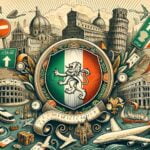What are the rules for travel to Italy? As travel restrictions continue to evolve, it’s important for travelers to stay informed about the latest entry requirements and health regulations.
From visa and passport guidelines to COVID-19 testing and quarantine rules, there are several considerations to keep in mind when planning a trip to Italy. In this article, we will explore the various rules and regulations that travelers need to be aware of before embarking on their journey to this beautiful country.
Italy is known for its rich history, stunning landscapes, and vibrant culture, making it a popular destination for tourists from around the world. However, as the global pandemic continues to impact travel, visiting Italy now comes with a new set of guidelines and precautions. From entry requirements and quarantine guidelines to health and safety protocols, there are several important factors to consider when planning a trip to Italy.
In this comprehensive guide, we will delve into the various aspects of traveling to Italy in the current climate. We will discuss entry requirements such as visas, passports, and COVID-19 testing, as well as provide insights into quarantine guidelines upon arrival. Additionally, we will explore health and safety protocols including mask mandates and social distancing measures.
Whether you’re considering exploring the historic streets of Rome or basking in the beauty of the Amalfi Coast, understanding these rules is essential for a smooth and enjoyable travel experience in Italy. So let’s dive in and discover what you need to know before planning your next adventure in this stunning Mediterranean country.
Entry Requirements
Before traveling to Italy, it is essential to understand the entry requirements, including visas, passports, and COVID-19 testing. The specific requirements may vary depending on your country of origin and vaccination status. As of now, Italy allows travelers from certain countries to enter without a visa for short stays. It is important to check the official website of the Italian government or consult with the nearest Italian embassy or consulate to determine the visa requirements for your specific situation.
In addition to a valid passport and possibly a visa, travelers to Italy are also required to adhere to COVID-19 testing guidelines. Currently, all individuals entering Italy from certain countries must provide a negative COVID-19 test result taken within a specified timeframe before arrival.
Furthermore, travelers may be subject to additional testing or quarantine measures upon arrival based on their vaccination status and the prevalence of COVID-19 in their country of departure. It is crucial to stay updated on these requirements as they can change frequently based on the evolving nature of the pandemic.
As you plan your trip to Italy, it is advisable to research and familiarize yourself with the entry requirements well in advance. By understanding what is necessary in terms of visas, passports, and COVID-19 testing, you can ensure a smooth and hassle-free entry into Italy.
| Entry Requirement | Details |
|---|---|
| Visa | Check Italian embassy or consulate for specific visa requirements |
| Passport | Ensure passport validity for at least six months beyond planned date of departure |
| COVID-19 Testing | Negative test result required for entry from certain countries; potential additional testing or quarantine based on vaccination status and COVID-19 prevalence |
Quarantine Guidelines
Upon arrival in Italy, travelers must adhere to specific quarantine guidelines to ensure the safety and well-being of both visitors and residents. The following are important points to consider when preparing for your trip:
- Quarantine Period: Upon arrival in Italy, travelers from certain countries may be required to self-isolate for a period of 5-10 days, depending on the traveler’s origin and vaccination status. It is essential to check the latest travel advisories and guidelines from the Italian government to determine if you are subject to quarantine requirements.
- COVID-19 Testing: In addition to quarantine measures, all travelers arriving in Italy are typically required to present proof of a negative COVID-19 test taken no more than 72 hours before entering the country. Some travelers may also be subject to additional testing upon arrival at Italian airports. It’s crucial to stay informed about the latest testing requirements prior to your departure.
- Monitoring and Compliance: Travelers who are required to quarantine upon arrival in Italy must promptly report their presence in the country and undergo health monitoring as prescribed by local health authorities. Non-compliance with quarantine regulations can result in fines or other penalties.
Before traveling to Italy, it’s important for visitors to carefully review and understand the current quarantine guidelines set by Italian officials. By staying informed and following these regulations, travelers can help contribute to a safe and enjoyable experience during their time in this beautiful country.
Health and Safety Protocols
Traveling to Italy during the COVID-19 pandemic requires adherence to strict health and safety protocols to ensure the well-being of both visitors and locals. Here are some important guidelines to keep in mind:
- Mask Mandates: In Italy, wearing a mask is mandatory in all indoor public spaces, including shops, restaurants, and public transportation. Additionally, masks must be worn in outdoor settings where social distancing cannot be maintained.
- Social Distancing: Travelers must adhere to the 1-meter social distancing rule in all public places. This includes maintaining a safe distance from others while waiting in line, sitting at restaurants, or exploring tourist attractions.
Visitors should also familiarize themselves with additional regulations imposed by the Italian government to mitigate the spread of COVID-19. These may include capacity limits at indoor venues, such as museums and churches, as well as restrictions on large gatherings.
When preparing for your trip to Italy, it is essential to pack an ample supply of face masks and hand sanitizer to comply with these health and safety protocols throughout your travels. By adhering to these guidelines, tourists can enjoy their time in Italy while respecting the country’s efforts to protect public health.
Transportation Regulations
When traveling to Italy, it is important to be aware of the transportation regulations in place for navigating public transportation and rental car rules. Italy offers a variety of transportation options for getting around, including trains, buses, and rental cars. However, there are specific guidelines and regulations that travelers must adhere to in order to ensure a smooth and enjoyable experience while exploring the country.
For those planning to use public transportation in Italy, it is essential to be aware of the current guidelines related to COVID-19. Depending on the region, there may be capacity limits and mask mandates in place for using public transportation. Travelers should also familiarize themselves with any specific requirements for boarding trains or buses, as well as any sanitation measures that may be in effect.
In addition to public transportation, many travelers opt to rent a car while visiting Italy in order to have the flexibility to explore various regions at their own pace. When renting a car in Italy, it is important to have the proper documentation, including a valid driver’s license and an International Driving Permit if required.
It is also crucial to understand the local traffic laws and regulations, as they may differ from those in other countries. By familiarizing oneself with the rules of the road and adhering to speed limits and parking regulations, travelers can ensure a safe and enjoyable driving experience during their time in Italy.
Accommodation Considerations
When planning a trip to Italy, it is essential to consider the accommodation options available. Whether you prefer the convenience of a hotel or the comfort of a vacation rental, there are specific rules and restrictions in place that you need to be aware of.
For travelers entering Italy, it is important to note that hotels and vacation rentals may have specific requirements for guests. This could include providing proof of a negative COVID-19 test or proof of vaccination upon check-in. Additionally, some accommodations may have limited capacity or implement social distancing measures in common areas such as lobbies and dining facilities.
In terms of vacation rental restrictions, travelers should be aware that there may be limitations on the number of guests allowed per booking. It is also advisable to check with the rental property regarding their cleaning and sanitation protocols to ensure a safe and comfortable stay. Understanding these accommodation considerations will help travelers plan their trip to Italy with confidence and peace of mind.
| Accommodation Considerations | Hotel | Vacation Rental |
|---|---|---|
| Requirements for Guests | Proof of negative COVID-19 test or vaccination | Limited number of guests per booking |
| Safety Measures | Limited capacity and social distancing in common areas | Cleaning and sanitation protocols |
Dining and Entertainment
Italy is known for its delicious cuisine and vibrant entertainment scene, making it a popular destination for travelers from around the world. However, in light of the COVID-19 pandemic, there are specific rules and restrictions that visitors must be aware of when it comes to dining and entertainment in Italy.
Restaurant Restrictions
When it comes to dining out in Italy, travelers should be aware that there are specific guidelines and restrictions in place to ensure the safety of both patrons and staff. Restaurants are required to operate at limited capacity, implement social distancing measures between tables, and enforce mask-wearing when not seated at a table. Additionally, advance reservations may be required at some establishments to manage capacity.
Event Venue Restrictions
For those looking to experience Italy’s vibrant entertainment scene, it’s important to be aware of the restrictions on event venues. Whether it’s attending a live music performance, visiting a museum, or participating in a cultural event, travelers should expect limited capacity, mask mandates, and social distancing requirements. Some venues may also require advance ticket purchases or reservations to manage crowd sizes.
Navigating Dining and Entertainment Safely
To ensure a smooth and enjoyable experience while dining out or enjoying entertainment in Italy, travelers should familiarize themselves with the specific rules and regulations in place at their desired destinations. It’s recommended to check the latest guidelines from local authorities or contact venues directly for any additional requirements or protocols.
By staying informed and adhering to these regulations, visitors can enjoy their time exploring Italy’s culinary delights and rich cultural experiences while prioritizing health and safety amidst the ongoing pandemic.
Cultural Etiquette
Italy is a country known for its rich culture, history, and traditions. Understanding and respecting Italian customs is essential for any traveler visiting this beautiful country. From greetings to dining etiquette, here are some important cultural aspects to keep in mind when traveling to Italy.
Greetings and Social Etiquette
In Italy, greetings are an important part of social interactions. When meeting someone for the first time, a firm handshake is the most common form of greeting. Friends and acquaintances often greet each other with a kiss on the cheek, starting with the left cheek. It’s important to remember that Italians appreciate personal space and may stand closer during conversations than what is customary in other countries.
Dining Customs
Italian cuisine is renowned around the world, and dining in Italy is an experience not to be missed. When dining out, it’s common for Italians to take their time enjoying their meals and engaging in lively conversation. Always wait to be seated by the host or hostess, and avoid ordering a cappuccino after a meal as it is considered a breakfast drink in Italy.
Respecting Historical Sites and Religious Customs
Italy is home to numerous historical sites and religious landmarks that hold significance for its people. When visiting these places, it’s important to dress modestly and behave respectfully. This includes covering your shoulders and knees when entering churches or religious sites.
Understanding these cultural customs will not only help you navigate your travels more effectively but also show respect for the local way of life.
Conclusion
In conclusion, planning a trip to Italy requires careful consideration of the entry requirements, quarantine guidelines, health and safety protocols, transportation regulations, accommodation considerations, dining and entertainment restrictions, and cultural etiquette. As travel restrictions and guidelines continue to evolve in response to the COVID-19 pandemic, it is important for travelers to stay informed about the latest rules and regulations for traveling to Italy.
Before embarking on your journey, make sure to check the latest entry requirements for Italy, including visa and passport regulations as well as COVID-19 testing and vaccination requirements. Additionally, be prepared to adhere to quarantine guidelines upon arrival in Italy and familiarize yourself with the health and safety protocols in place, such as mask mandates and social distancing measures.
When navigating public transportation or renting a car in Italy, be mindful of transportation regulations and any specific rules or restrictions that may apply. Likewise, if staying in a hotel or vacation rental, be aware of any accommodations considerations or limitations that may impact your travel plans. Furthermore, when dining out or visiting event venues in Italy, it is essential to follow restaurant and entertainment restrictions that are in place.
By understanding and respecting Italian customs and traditions, travelers can show cultural etiquette during their visit to Italy. With careful planning and adherence to the rules for travel to Italy, you can embark on your trip with confidence while enjoying the beauty of this remarkable country.
Frequently Asked Questions
What Is Required for a US Citizen to Visit Italy?
To visit Italy, a US citizen needs a valid passport that doesn’t expire for at least three months after their planned departure from Italy. They also don’t need a visa for stays up to 90 days.
Are There Any Travel Restrictions to Italy?
As of now, there are travel restrictions to Italy due to the COVID-19 pandemic. Travelers must check the latest updates on entry requirements, quarantine rules, and any other restrictions before planning their trip.
What Documents Do I Need to Fly to Italy?
When flying to Italy, US citizens need a valid passport. Depending on the length of stay and the purpose of the visit, they may also need a visa. It’s important to check with the Italian embassy or consulate for specific requirements before traveling.

I’m a passionate traveler, writer, and Italophile. My fascination with Italy’s history, art, and culture has led me on countless adventures across the Italian landscape. Through “I Live Italy,” I share my love for this extraordinary country and aims to inspire others to explore its boundless beauty.




